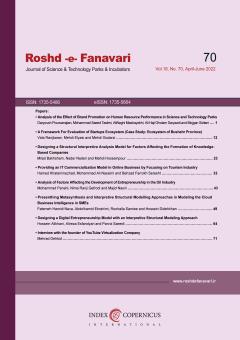Designing a digital entrepreneurship model with an interpretive structural modeling approach
Subject Areas : Entrepreneurship and Mnagement of Knowledge-based Firms
hossein alikhani
1
,
alireza isfandyari
2
,
parviz saeedi
3
![]()
1 -
2 - دانشگاه آزاد اسلامی علی اباد کتول
3 -
Keywords: Digital Entrepreneurship, Knowledge-Based Companies, Interpretive Structural Modeling,
Abstract :
Entering the age that is common in the information society, entrepreneurship in the digital space as a new approach to starting businesses based on a new thinking and idea has found a prominent place among service and production activists. He was the founder of Mazandaran province that structural and interpretive modeling method was used in designing this model. The research method was descriptive-correlational. According to the research background,39components were selected in the form of seven dimensions (structural-strategy-management-people-technology-content-environment).Then,the opinions of 20 university professors and managers of knowledge-based companies who were experts in the field of digital entrepreneurship were used. Interpretive structural modeling and MICMAC analysis were used to cluster the dimensions of digital entrepreneurship. ISM results showed that the foundation of digital entrepreneurship is first (structural-technological), second (managerial), third (strategy) and fourth (people-content-environmental). Also, after MICMAC analysis, the dimensions (structural-technology) in the independent cluster and the dimensions (individuals-content-environment) in the dependent cluster and the dimensions (strategy-management) in the autonomous cluster were included. Finally, it can be said that digital entrepreneurship is important not only for technology companies and IT sectors, but also for all industries.
1- تواضعیفر، اسما، شیهکی تاش، مهیم، کشاورز، سهیلا. شناسایی پیشرانهای مؤثر بر کارآفرینی دیجیتال در کسبوکارهای کوچک و متوسط با رویکرد فراترکیب. فصلنامه سیاست نامه علم و فناوری، 9(3):61-71، 1398.
2- خوراکیان، علیرضا، عطارمقدم، ندا. عوامل اثرگذار بر زمان فاز رشد فرایند توسعه محصول جدید در شرکتهای دانشبنیان با استفاده از رویکرد دیمتل و سیستم پویا. فصلنامه مدیریت توسعه فناوری، 5(4):73-101، 1397.
3- خیاطیان، محمدصادق، الیاسی، مهدي، طباطبائیان، سیدحبیباله. الگوي پایداري شرکتهاي دانشبنیان در ایران. فصلنامه سیاست علم و فناوری، 8(2):49-62، 1395.
4- ایماني، عبدالمجيد، حسينيفر، اعظم، مبارکي، مسلم. تأثیر شبکههای اجتماعی بر کارآفرینی دیجیتالی در شرکتهای دانشبنیان. فصلنامة مطالعات مدیریت کسب و کار هوشمند، 6(22):1-22، 1396.
5- عابدي، هدي، بابالحوائجي، فهيمه، حسنزاده، محمد. سنجش همافزايي اقتصاد دانشبنيان در ايران و ارائه الگويي براي تبيين كاركرد عوامل مؤثر در اقتصاد دانشبنيان با استفاده از رويكرد مارپيچ سهگانه. پژوهشنامه علمسنجي، 3(2):147-172، 1396.
6- ایماني، عبدالمجيد، حسينيفر، اعظم، آهنگ، فرحناز. تأثیر شبکههای اجتماعی بر کارآفرینی دیجیتالی با نقش میانجی تشخیص فرصت (مطالعه شرکتهای دانشبنیان مستقر در پارک علم و فناوری استان کرمان). فصلنامة پژوهشهای مدیریت عمومی، 6(22):1-22، 1397.
7- علی عسکری، محمدرضا، عزیزی، شهریار، حاجیپور، بهمن. طراحی و تبیین الگوی توسعه کارآفرینی در فضای مجازی ایران با تأکید بر سیاستهای اقتصاد مقاومتی. فصلنامه مطالعات راهبردی بسیج، 21(81):103-135، 1397.
8- کشاورز، سهیلا، تقوا، محمدرضا، کرد، حامد. شناسایی پیشرانهای موفقیت کارآفرینی دیجیتالی با رویکرد فراترکیب. فصلنامه مدیریت توسعه فناوری، 7(3):149-172، 1398.
9- اکبری، محسن، هوشمند چایجانی، میلاد، بشارتی، فهیمه. شناسایی و رتبهبندی عوامل مؤثر بر کارآفرینی دیجیتال در بین دانشجویان با استفاده از متدولوژی AHP. اولین کنفرانس ملی چالشهای مدیریت فناوری اطلاعات در سازمانها و صنایع، 1393.
10- یعقوبی، نورمحمد، کمالیان، امینرضا، میرپارسا، ساناز. بررسی و تبیین و اولویتبندی عوامل مؤثر بر موفقیت و توسعه کارآفرینی دیجیتالی. دومین کنفرانس بینالمللی مدیریت، کارآفرینی و توسعه اقتصادی، 1392.
11- میرپارسا، ساناز. اولویتبندی عوامل مؤثر بر توسعه کارآفرینی دیجیتال در استان سیستان و بلوچستان. پایاننامه کارشناسیارشد، دانشگاه سیستان و بلوچستان، 1392.
12- رمضانیپور، عابد، عبدی، مهدی. بررسی نقش کارآفرینی دیجیتال در بهبود وضعیت اشتغال، نظم و امنیت. فصلنامه دانش انتظامی گیلان، 1(2):52-73، 1391.
13- میرشمسی، فاطمه. شناسایی عوامل مؤثر بر توسعه کارآفرینی دیجیتالی (مطالعه موردی: شهر مشهد). پایاننامه کارشناسیارشد، دانشگاه سیستان و بلوچستان، 1390.
14- فيروزجائيان، علياصغر، فيروزجائيان، مجتبي، هاشمي پطرودي، سيدحميد، غلامرضازاده، فاطمه. كاربرد تكنيك مدلسازي ساختاري تفسيري در مطالعات گردشگري (تحليلي با رويكرد آسيبشناسانه). مجله برنامهريزي و توسعه گردشگري، 2(6):129-159، 1392.
15- آذر، عادل، خسروانی، فرزانه. تحقیق در عملیات نرم (رویکردهای ساختاردهی مسأله). انتشارات سازمان مدیریت صنعتی. تهران، 1398.
16- George, G, Ryan K. Merrill, Simon J. D. Schillebeeckx. Digital Sustainability and Entrepreneurship: How Digital Innovations Are Helping Tackle Climate Change and Sustainable Development. Entrepreneurship Theory and Practice, 1(1):1-28, 2019.
17- Geissinger, A., Laurell, Ch., Sandström, Ch., Eriksson, K. & Nykvist, R. Digital entrepreneurship and field conditions for institutional changeInvestigating the enabling role of cities. Technological Forecasting & Social Change, 146:877-886, 2018.
18- Samuel,A, Richard, B, Emmanuel, A,Acheampong, O,Ibrahim, B. Digital Entrepreneurship in Business Enterprises: A Systematic Review. International Federation for Information Processing, 1(1): 192.203, 2020.
19- Domingo E, William, M, Sascha, K. Special issue on: innovation and knowledge-based economy for entrepreneurship and regional development. Entrepreneurship & Regional Development, 32:7-8, 2020.
20- Ratten, V. Social entrepreneurship through digital communication in farming.Word Journal of Entrepreneurship, Management and Sustainable Development, 14(1): 99-110, 2018.
21- Tumbas, S, Berente, N, Brocke, J. V. Digital innovation and institutional entrepreneurship: Chief Digital Officer perspectives of their emerging role. Journal or information Technology, 33:188-202, 2018.
22- Hull, C, Yu-Ting Caisy Hung, Neil Hair, Victor Perotti. Taking advantage of digital opportunities: A typology of digital entrepreneurship. International Journal of Networking and Virtual Organisations, 4(3): 290-303, 2007.
23- Satalkina, L, Steiner, G. Digital Entrepreneurship and its Role in Innovation Systems: A Systematic Literature Review as a Basis for Future Research Avenues for Sustainable Transitions. Sustainability, 12:1-27, 2020.
24- Bican, P, Brem, A. Digital Business Model, Digital Transformation, Digital Entrepreneurship: Is There A Sustainable “Digital”?. Sustainability, 12:1-15, 2020.
25- Antonizzi, J, Smuts, H. The Characteristics of Digital Entrepreneurship and Digital Transformation: A Systematic Literature Review. International Federation for Information Processing, 1(1): 239-251, 2020.
26- Recker, J, Von Briel, F. The Future of Digital Entrepreneurship Research: Existing and Emerging Opportunities. Fortieth International Conference on Information Systems, 2019.
27- Kamalian, A, Yaghoubi, N, Moloudi, J. Providing functional Model for Developing Digital Entrepreneurship. International Journal of Business and Development Studies, 8(1):97-116, 2016.
28- Warfield, J.W. Developing interconnected matrices in structural modelling, IEEE transcript on systems, Men and Cybernetics, 4(1): 51-81, 1974.
29- Faisal, M. Banwet, D. K. and Shankar, R. Supply chain risk mitigation: modelling the enablers, Business Process Management, 12(4): 535-552, 2006.


